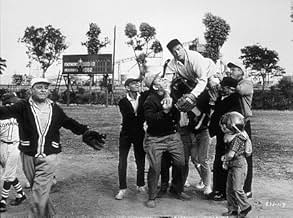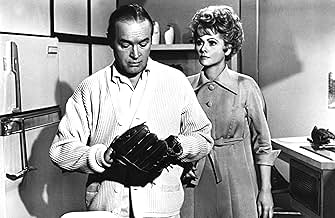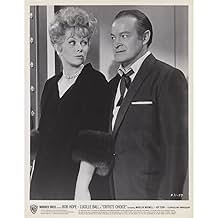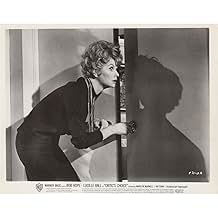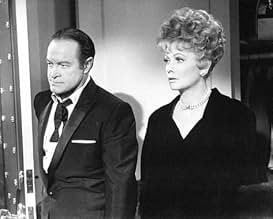Adicionar um enredo no seu idiomaParker Ballantine is a New York theater critic and his wife writes a play that may or may not be very good. Now Parker must either get out of reviewing the play or cause the breakup of his m... Ler tudoParker Ballantine is a New York theater critic and his wife writes a play that may or may not be very good. Now Parker must either get out of reviewing the play or cause the breakup of his marriage.Parker Ballantine is a New York theater critic and his wife writes a play that may or may not be very good. Now Parker must either get out of reviewing the play or cause the breakup of his marriage.
- Direção
- Roteiristas
- Artistas
- John Ballantine
- (as Ricky Kelman)
- Philip 'Phil' Yardley
- (as Evan McCord)
- Direção
- Roteiristas
- Elenco e equipe completos
- Produção, bilheteria e muito mais no IMDbPro
Avaliações em destaque
Like one of Hope and Ball's previous films, "The Facts of Life", "Critic's Choice" isn't exactly a comedy. While Hope spouts a variety of one-liners instead of real dialog (something I really dislike after a while), the emphasis is not on comedy but is more like a drama. This isn't a complaint...more an observation. And, it's interesting that Hope's character is rather petulant...a real departure for him.
Although the film apparently was a box office failure, I actually thought it was pretty good. But as I mentioned above, it wasn't a comedy and Hope played a guy who was a bit of a jerk....and that likely turned audience members off to the film back in 1963. An interesting departure for Hope...and a film that is worth your time.
It's interesting that his second wife is more age appropriate than the first wife. I would expect it to be the opposite. A switch would make them fit the stereotypes, but it would also deprive the movie of the Hope Ball pairing. I'll take the pairing over the stereotyping. Their stardoms have faded from their pinnacles, but they still have plenty of star power. As a comedy, this is lacking especially considering the two legends involved. It's more a drama than a comedy. At least, it's better as a drama than a comedy. Bob Hope does his comedic mugging and it's not that funny. There is potential with the marital conflict. It works, but I would like more from Ball. This is very much his movie instead of their movie. This was sold as a comedy. It tries to be a comedy. They should have concentrated more on the drama.
If I were to rate this as a comedy, I'd probably say that it fell flat - but I was actually quite taken with the story and the character of Parker. He was an unpleasant character. Yes, Hope played him with some comedy - but he wasn't a nice man. Once Angie decided to write her play (very early in the movie) Parker wouldn't let his critic's voice go. He discouraged her, he belittled her, he made fun of her - and most of it, while couched as a comedy, was actually rather mean and not funny. When the movie opened, Parker was writing a scathing review of a play that starred his ex-wife (who was played by Marilyn Maxwell.) That goes almost immediately into his acerbic attitude toward Angie's play. The point gets made in the movie that maybe Parker has a problem - he disses everything that the women who are close to him try to do, almost as if he's trying to sabotage them and their careers; as if he doesn't want a "successful" woman in his life. And, although there's an attempt to redeem him slightly at the end, Parker's most obnoxious scenes come late in the movie at the theatre, the night Angie's play opens in New York. Having withdrawn from reviewing the play, he shows up anyway - drunk and, frankly, obnoxious (I'm not sure why he wouldn't have been kicked out of the theatre, or even why he was allowed in in the first place) - tries to kick his paper's reviewer out and when he can't do that goes up to the balcony and causes quite a scene (this is where Hope's physical comedy comes in.) He then proceeds to write a review of the play anyway and his review is blistering, as he writes that the play "was written by Angela Ballantine, directed by Dion Kapakos, and produced by mistake." (I must admit that I wondered why his paper would allow a drunken reviewer - even a big name one - to write a review of a play written by his own wife to which someone else had been assigned as the reviewer, but maybe that's thinking too much about this.)
This was not what I was expecting. I was expecting a light comedy - instead I got more of a drama about a couple with some really serious issues in their marriage. And while I wouldn't rate it that highly as a comedy, I thought that if you look at it as a marital drama it's actually pretty good. For me, the most powerful scene in the movie didn't even involve Ball - it was the very dramatic and even acerbic confrontation between Parker and his son John (played by Ricky Kelman) - who seems to have irritated a few reviewers, but who I thought was actually pretty good, playing a kid who had obviously been raised in a somewhat strange environment. The scene was set at home on opening night, before Parker's drinking binge. That confrontation aside, John's relationship with his mother (Maxwell) was especially weird - she seems to have been largely uninterested in him, and he calls her not "Mom" but "Ivy."
There's a decent supporting cast - most of whose names (Rip Torn, Jim Backus, Richard Deacon and even Soupy Sales) add to the expectation that you're going to be watching a funny movie. But I would suggest not watching this to get a good laugh, even if that is your initial expectation. Watch it as more of a character study of Parker. It works much better that way. (7/10)
Você sabia?
- CuriosidadesLast of four feature films that Bob Hope and Lucille Ball made together. The other three pictures were Um Conde em Sinuca (1950), A Menina dos Meus Olhos (1949), and O Jogo Proibido do Amor (1960).
- Erros de gravaçãoThe movie takes place in New York, but during the softball game, the famed Los Angeles Gas Works tank is clearly visible in the background.
- Citações
John Ballantine: For the record, Sisters Three was written by Angela Ballantine, directed by Dion Kapakos, and produced by mistake.
- Cenas durante ou pós-créditosEnding: "The absolute End"
- ConexõesReferenced in What's My Line?: Bob Hope and Lucille Ball (1963)
Principais escolhas
- How long is Critic's Choice?Fornecido pela Alexa
Detalhes
- Data de lançamento
- País de origem
- Idioma
- Também conhecido como
- Cuando el corazón manda
- Locações de filme
- William Mead Homes, 1300 Cardinal Street, Los Angeles, Califórnia, EUA(Apartments/baseball field)
- Empresa de produção
- Consulte mais créditos da empresa na IMDbPro
- Tempo de duração
- 1 h 40 min(100 min)
- Proporção
- 2.35 : 1


